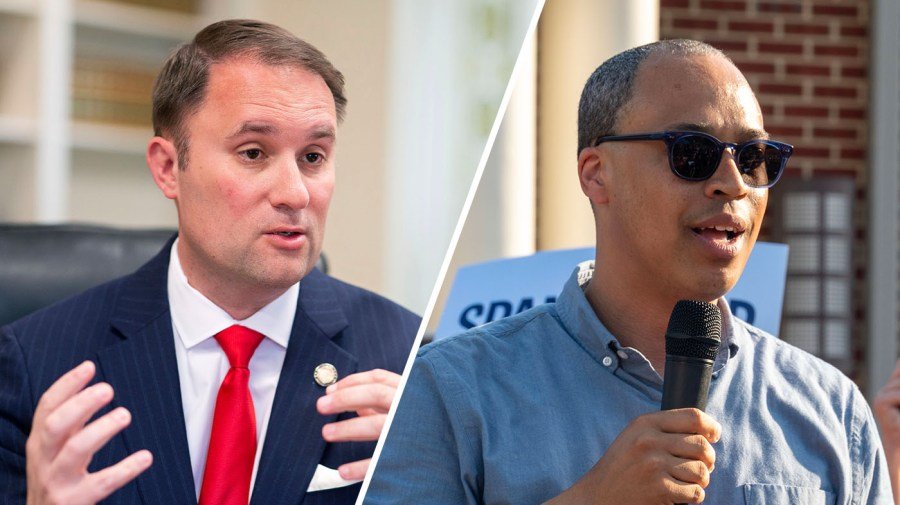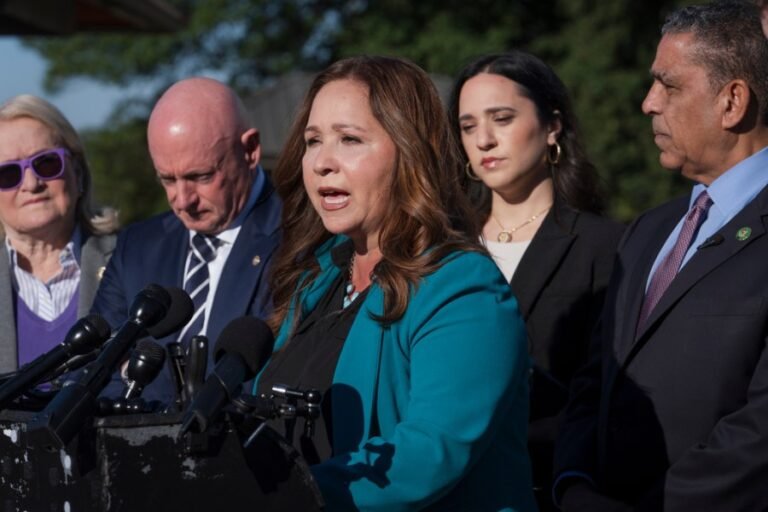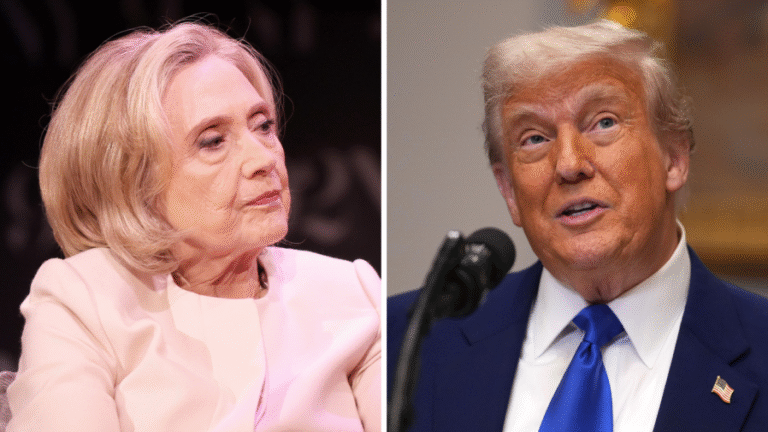
Morning Report is The Hill’s a.m. newsletter. Subscribe here.
In today’s issue:
▪ 2025’s marquee debates
▪ Redistricting battle in court
▪ Thune offers Dems vote on ObamaCare subsidies
▪ Trump authorizes CIA action in Venezuela
Two of the biggest political debates of the year will be held Thursday night back-to-back, a high-stakes test that could shape the final weeks of the election.
In Virginia, Democratic attorney general nominee Jay Jones is scrambling to get his campaign back on track as he’s set to face incumbent state Attorney General Jason Miyares (R).
New York City mayoral front-runner Zohran Mamdani will be the center of attacks on two sides Thursday when he faces off against former New York Gov. Andrew Cuomo, who’s running as an independent, and Republican nominee Curtis Sliwa.
The Virginia debate will begin at 6 p.m., while the New York City faceoff will start at 7 p.m.
Jones’s campaign is still reeling from leaked text messages he sent in 2022 in which he said he hoped for violence against then-state House Speaker Todd Gilbert (R) and his family.
The Democratic candidate has apologized for sending the texts and said he wishes he could take them back, but he’s rebuffed calls from Republicans to exit the race.
Thursday’s debate, the only face-to-face between the candidates, will be perhaps Jones’s best opportunity to address the controversy and try to prove to voters he deserves to become Virginia’s top law enforcement official.
Former Rep. Abigail Spanberger, the Democratic gubernatorial nominee, and Lt. Gov. Winsome Earle-Sears, the Republican nominee, already faced off in their lone debate last week. The second and final debate of New Jersey’s gubernatorial race between Rep. Mikie Sherrill (D) and Jack Ciattarelli (R) also took place last week.
The attorney general contest already was viewed as the closest of Virginia’s three statewide races this year, but it’s tightened even more since the texts came out. Jones and Miyares are tied at 46.4 percent support each in the Decision Desk HQ polling average.
▪ The Hill: Leaked texts put spotlight on Virginia attorney general debate.
▪ Virginia Mercury: Jones texting scandal tests Spanberger’s ticket.
▪ WTOP: Will text message scandal derail Democrats in Virginia?
Zooming north, while Mamdani is heavily favored in New York City’s mayoral race after defeating Cuomo and other rivals in the Democratic primary earlier this year, that doesn’t mean he’s locked up victory.
Polling has consistently shown Mamdani with a double-digit lead in the general election race but with less than majority support, suggesting a possible opening for another candidate. Those opposed to Mamdani, a self-described democratic socialist, have expressed concerns the anti-Mamdani vote will be split among multiple candidates, allowing him to win.
Some steps to coalesce the opposition have been successful, as incumbent Mayor Eric Adams and independent Jim Walden both have dropped out of the race, acknowledging the long odds they faced. But Sliwa has steadfastly resisted dropping out to help boost Cuomo, who has regularly polled in second place.
Still, the debate will be a key test for whether candidates can appeal to the constituencies they need to ensure victory.
For Mamdani, that’s voters who regularly vote Democratic but have been hesitant to vote for him, expressing concern that he’s too far left. If Mamdani were to win the race but with less than a majority, he’d be the first mayor of the city to do so in nearly 50 years.
For Cuomo, it’s voters who previously made up a key part of Adams’s coalition who are now up for grabs. Both appeal to similar types of voters — moderates, older voters, Black and Latino voters who are more concerned about crime — presenting Cuomo with a clear opportunity.
But he needs to win over an overwhelming majority of these voters even to have a chance at pulling off an upset against Mamdani.
The Hill’s Caroline Vakil has five things to watch going into the debate.
MAMDANI’S MESSAGE TO TRUMP: Mamdani directly addressed President Trump during an interview on Fox News on Wednesday night, pledging he would be different than incumbent mayor Adams.
Mamdani said while speaking with Martha MacCallum that unlike Adams, he wouldn’t call to “figure out how to stay out of jail,” and unlike Cuomo, he wouldn’t call to ask “how to win this election.”
“I will, however, be a mayor who is ready to speak at any time to lower the cost of living. That’s the way that I am going to lead this city,” Mamdani said. “That’s the partnership I want to build not only with Washington, D.C., but with anyone across this country.”
Mamdani also weighed in on several key national and local issues, including the recent ceasefire deal between Israel and Hamas. He said now is “too early” to give Trump credit on the deal, but credit would be due if it proves “durable.”
He also apologized to the New York Police Department for past comments he made calling them “racist,” “wicked” and “corrupt.”
In the aftermath of George Floyd‘s murder in 2020, Mamdani made several posts on the social platform X criticizing the local police and calling for them to be defunded. He’s said that he no longer supports defunding the police.
“And I apologize because of the fact that I’m looking to work with these officers. And I know that these officers, these men and women who serve in the NYPD, they put their lives on the line every single day,” Mamdani said.
Mamdani has said he’s previously apologized to individual police officers but hadn’t yet issued a full public apology to the department as a whole.
▪ Politico: Mamdani needs a mistake-free debate night against Cuomo.
▪ The Guardian: The Republican eccentric street vigilante who could secure Mamdani’s win.
3 Things to Know Today
1. A federal judge has temporarily blocked the Trump administration’s efforts to lay off thousands of government workers amid the government shutdown, ruling the moves are likely illegal and exceed the government’s authority.
2. Journalists from numerous news outlets turned in their press badges to the Pentagon on Wednesday rather than agree to the department’s new restrictive press policy. Among the outlets that refused to sign the policy is Fox News, Defense Secretary Pete Hegseth’s former employer.
3. About a dozen leaders associated with the Young Republican National Federation sent messages in group chats in which they joked about gas chambers, slavery and rape. Here’s a look at the Young Republicans at the center of the story and the fallout.
Leading the Day

REDISTRICTING WAR HEATS UP: The fierce battle over redistricting is only intensifying, both in Washington and across the country.
The Supreme Court heard arguments Wednesday over the use of race in redistricting, which could have major implications in states’ efforts to redraw their congressional lines ahead of next year’s midterms.
The court leaned toward restricting the use of race in redistricting during the arguments over Louisiana’s congressional map, The Hill’s Zach Schonfeld and Ella Lee report. That potentially means the court could curtail Section 2 of the Voting Rights Act of 1965.
The law requires states to intentionally draw more majority-minority districts, but the justices are weighing whether race-based redistricting under Section 2 complies with the 14th and 15th amendments to the Constitution. How broadly the court’s ruling will be is unclear, but several conservative justices questioned if the court’s precedents on voting rights need to be revisited.
“This court’s cases in a variety of contexts have said that race-based remedies are permissible for a period of time. Sometimes for a long period of time, decades in some cases,” said Justice Brett Kavanaugh.
“But that they should not be indefinite and should have an end point,” he continued.
The timing of the case is key, as several states are moving forward with mid-decade redistricting efforts.
Republican lawmakers in Texas and Missouri have already approved new maps set to take effect in time for the 2026 midterms. Lawsuits have been filed in both states to try to block them.
But the battle seems likely to grow.
Democrats have responded to the GOP’s push with a redistricting effort of their own in California, where voters are set to weigh in on a ballot measure next month. It would allow the state Legislature to redraw district lines in California for the rest of the decade, temporarily going around the state’s independent commission charged with drawing the maps.
Former President Obama appeared in an ad released this week endorsing the redistricting effort, bringing one of the most popular and well-known Democratic figures into the battle.
“Republicans want to steal enough seats in Congress to rig the next election and wield enough unchecked power for two more years. With [Proposition] 50, you can stop Republicans in their tracks,” he said.
But Republicans seem to have a few more opportunities to gain seats through this redistricting process than Democrats, even if California is able to redraw its lines.
Ohio is required by state law to redraw its lines ahead of the midterms, but it’s still expected to produce one or two extra seats for the GOP. Florida Republicans have also discussed redistricting.
As Indiana lawmakers have expressed some hesitation about proposing a new map, Vice President Vance visited the state last week to renew a push to enact new lines that would net the GOP another seat.
And North Carolina Republicans are set to propose a new map in the General Assembly next week. Democratic Gov. Josh Stein slammed the effort, but he’d be powerless to stop it as the governor can’t veto a new map. Republicans control both houses of the North Carolina state Legislature.
▪ Louisiana Illuminator: Louisiana at the center of conservatives’ redistricting battle.
▪ CNN: California’s redistricting fight is about Gov. Gavin Newsom.
THUNE’S GAMBIT: Senate Majority Leader John Thune (R-S.D.) is planning to bring a spending bill for the Pentagon to the floor Thursday, trying to put Democrats in a bind as they try to keep the focus on health care amid the government shutdown.
The $852 billion defense appropriations bill will get a vote after it passed the Senate Appropriations Committee in July with strong Democratic support — 26 to 3. But the politics have changed, with the shutdown now in its third week.
Republicans are trying to emphasize how the shutdown is affecting national security, pointing to the scheduled payday for military servicemembers on Wednesday. President Trump directed Hegseth to use “all available funds” to ensure troops did not miss their first paychecks because of the shutdown.
Senate Minority Whip Dick Durbin (D-Ill.) said he hadn’t made a public decision yet on how to vote on the measure, saying Thune’s decision to set up a vote “came as a surprise to us.”
The scheduled vote comes as Republicans try to wrestle back momentum from Democrats in the shutdown battle amid mixed polling over who is to blame.
Along with the pending defense bill vote, Thune has started forcing Democrats to vote against the House-passed continuing resolution to reopen the government while not having an opportunity to vote on the Democratic alternative.
One Democratic senator who requested anonymity told The Hill’s Alexander Bolton that there’s a group of nervous centrist Democrats who would be eager to vote to reopen the government if Trump makes any concession addressing rising health care costs. Thune has kept his conference united, and Trump has also held the line after briefly suggesting openness to a deal.
NEW THIS A.M.: Thune told MSNBC in an interview that aired early Thursday that he’s offered Democrats a separate vote on extending health care subsidies in exchange for reopening the government.
“I’ve said, if you need a vote, we can guarantee you get a vote by a date certain,” he said. “At some point Democrats have to take yes for an answer.”
▪ The Hill: Sen. John Fetterman (D-Pa.) criticizes fellow Democrats over shutdown at NewsNation town hall: ‘I follow the country, then party’
▪ The Washington Post: Trump is opting some of the government out of the shutdown.
▪ The Associated Press: Trump is making this shutdown unlike any other.
Where & When
The president will receive an intelligence briefing at 11 a.m. and make an announcement at 3 p.m.
The Senate will meet at 10 a.m.
The House is out.
Zoom In

DEM GENERATIONAL BATTLE: The latest battle between the Democratic Party’s older and younger generations of leaders is set, as Rep. Seth Moulton (D-Mass.) announced a primary challenge against Sen. Ed Markey (D).
Moulton emphasized his age, 46, in his launch video Wednesday, praising Markey as a “good man” but arguing that he shouldn’t be running for another six-year term at nearly 80 years old. He called for a “new generation of leadership.”
“We’re in a crisis, and with everything we learned last election, I just don’t believe Sen. Markey should be running for another six-year term at 80 years old. Even more, I don’t think someone who’s been in Congress for half a century is the right person to meet this moment and win the future,” Moulton said in his video.
Markey has already announced plans to seek a third term in office, which would have him serving until he’s 86 years old. He’s rolled out several high-profile endorsements, including from fellow Massachusetts Sen. Elizabeth Warren (D) and House Minority Whip Katherine Clark (D-Mass.).
Markey has held off a primary challenge before. In 2020, then-Rep. Joe Kennedy III (D-Mass.) challenged Markey for the Democratic nomination.
Kennedy and Markey were ideologically similar, and some Kennedy critics argued the congressman didn’t have a clear reason for challenging the incumbent senator.
Markey ultimately won the primary by about 10 points.
But Moulton is betting that the time is ripe for him to make the generational change argument against Markey.
In the aftermath of former President Biden’s ill-fated reelection bid and questions about his cognitive abilities toward the end of his presidency, Democrats have called for turning the page to younger leaders to represent the party.
Moulton, who is known as more of a moderate, will likely have to tack to the left to pull off an upset in the Democratic primary. In his launch video, some of his listed priorities are signature progressive goals — achieving universal health care, banning assault weapons and fighting climate change.
The primary challenge comes as Democrats are set to engage in another generational battle in New England between Maine Gov. Janet Mills (D), 77, and oyster farmer Graham Platner, 41. Mills is a top recruit of Senate Minority Leader Chuck Schumer (D-N.Y.) to challenge Maine Sen. Susan Collins (R) next year, but Platner has sought to rally populist and progressive support for his campaign.
Another similar generational battle is taking place in Washington, D.C., with Del. Eleanor Holmes Norton (D) running for another term as D.C. delegate at 88 years old, while she faces several younger challengers. These include Robert White and Brooke Pinto, two members of the D.C. City Council.
Rep. Ro Khanna (D-Calif.) emphasized the need for his party to bring in fresh blood during an event in Washington on Wednesday. “Everybody has a sell-by date. Some folks in our party haven’t recognized that yet,” he said.
▪ The Boston Globe: Why Moulton is running against Markey.
▪ Axios: Platner criticizes Mills as business as usual in first TV ad.

CIA’S VENEZUELA OP: Trump appeared to confirm that he authorized the CIA to carry out operations in Venezuela in what would be a significant escalation in the administration’s pressure on authoritarian leader Nicolás Maduro.
A reporter asked Trump in the Oval Office why he authorized the CIA to strike inside Venezuela, to which Trump responded by seeming to confirm the authorization and adding that he’s looking to expand to land strikes.
“I authorized for two reasons really, number one they have emptied their prisons into the United States of America, they came in through the border,” Trump said.
“A lot of drugs coming in from Venezuela, and a lot of drugs come in through the sea, but we’re going to stop them by land also,” he said.
Trump’s comments come as the U.S. military has conducted at least five strikes against boats in the Caribbean that the administration alleges were trying to smuggle drugs into the country.
Top Trump aides have reportedly pushed for ousting Maduro from power in the South American country.
Maduro has overseen an authoritarian government during his more than decade-long rule, accused of cracking down on press freedom, limiting due process and committing human rights violations. He’s also been accused of involvement in smuggling drugs to the U.S., though he’s denied those allegations.
▪ NPR: “Why is the Trump administration blowing up Venezuelan boats?”
▪ CBS News: Maduro orders new military exercises after latest boat blown up.
HAMAS REASSERTS AUTHORITY: Hamas has spent the past few days reasserting its power in the Gaza Strip, adding to some questions about whether the peace agreement with Israel can hold.
It’s carried out public executions of individuals accused of collaborating with Israel, cracked down on rival militias and pressed for loyalty as the “government” of Gaza, The Washington Post reported. These actions also come as tensions are rising over delays in Hamas returning the bodies of deceased hostages to Israel, a key part of the peace deal.
Hamas has so far provided the bodies of nine hostages, though Israel said one body didn’t match the identity of any former hostage in DNA testing. About 20 bodies of deceased hostages remain in Gaza.
Despite the tensions, senior Trump administration advisers told reporters that they haven’t witnessed any violations of the ceasefire.
“We’ve heard a lot of people saying, ‘Well, Hamas violated the deal, because not all the bodies have been returned.’ I think the understanding we had with them was we get all the live hostages out, which they did honor that, and right now, we have a mechanism in place where we’re working closely with mediators and with them [Hamas] to do our best to get as many bodies out as possible,” one senior adviser said.
Hamas had indicated that tracking down all the bodies of deceased hostages would take time and was unlikely to be complete within the 72-hour deadline to return living hostages.
The advisers said the administration is still pursuing Hamas’s demilitarization as part of the deal. Trump’s 20-point plan calls for Hamas to disarm and give up power in Gaza, which it hasn’t fully agreed to yet. A board of peace, chaired by Trump, would oversee the day-to-day operations of Gaza in a transition period until a new, more permanent government takes over.
Regional experts told The Hill that Hamas is likely to push for some amount of political inclusion as it takes responsibility for civilian services.
▪ The Hill: US military warns Hamas to end violence after executions video
Opinion
Elections in 2025 will say more than you think about campaigns in 2026 and 2028, writes The Hill opinion contributor Brad Bannon
Reliance on dangerous foreign generic drugs is killing Americans, Florida Sen. Rick Scott (R) writes in The Hill
The Closer

And finally … It’s Thursday, which means it’s time for our weekly Morning Report Quiz! With the government shutdown entering its third week, let’s test your knowledge of the shutdowns of the past and present.
Be sure to email your responses to jgans@thehill.com — please add “Quiz” to your subject line. Winners who submit correct answers will receive deserved newsletter fame on Friday.
In what year did the first government shutdown occur?
1. 1894
2. 1931
3. 1980
4. 1995
How long was the longest shutdown in U.S. history?
1. 21 days
2. 35 days
3. 41 days
4. 46 days
How many shutdowns have there been that have caused federal employees to be furloughed, including the current one?
1. 6
2. 11
3. 14
4. 16
How much money per week have federal officials indicated the economy could lose because of the shutdown?
1. $1 billion
2. $5 billion
3. $10 billion
4. $15 billion






